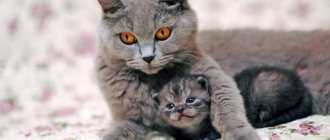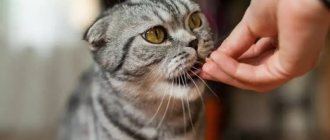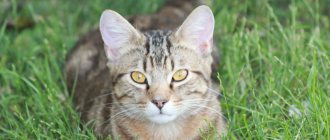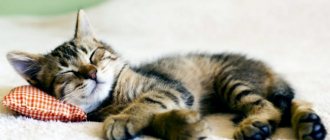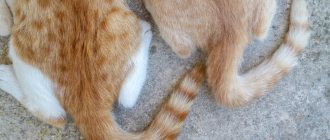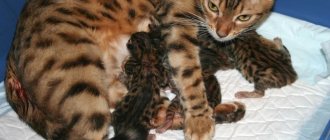The first animal domesticated by humans is believed to be the wolf, which is the distant ancestor of modern dogs. It was these animals that easily overcame their fear of people and, starting from the Stone Age, became their faithful companions and best friends. Cats have become other popular pets for people, but they are not considered man's best friend. Rather, they are considered charming but extremely lazy creatures who love freedom and hate being touched. People seem to have had the wrong idea about cats for thousands of years - but a new scientific study proves they are just as loyal to their owners as dogs.
A dog is man's best friend. But why not a cat?
Scientists have long been trying to figure out who is smarter - cats or dogs. Ultimately, most of them come to the conclusion that the mental abilities of dogs are much better developed than those of furry creatures. After all, if you watch dogs, you can see that they understand their owners much better and demonstrate their loyalty. Cats, in turn, like to be alone, but perhaps we are simply not paying attention to them.
Study: Do cats become attached to their owners?
In 2021, a neuropsychological empirical study was conducted at the College of Agriculture from the University of Oregon, USA, in the Human-Animal Interaction Laboratory. The main goal was to identify the main communication styles of cats with their owners. Project leader Christine Vitale and other authors published the results in the journal Current Biology.
During the experiment, the “Ainsworth baseline test” was conducted, previously used in a similar way in studying the behavior of dogs, primates and infants. The cats were left in a new room with the owner for two minutes, followed by a two-minute solo session, followed by a two-minute reunion phase. Both adults and kittens were studied.
It was demonstrated that upon the return of the “caregiver,” cats experienced less stress if a strong attachment had been formed with the owner. They resumed their exploration of the room. But if there were no such friendly relations with a person, then the animals continued to be nervous and showed obvious signs of stress: twitching their tail, avoiding a person, freezing.
This attachment of cats to people is explained by biologically adaptive behavior, since animals live in direct dependence on the owner. It is people who provide their little friends with access to food, water, and safety, that is, they act as a source of comfort. All domesticated animals develop social mechanisms for communicating with humans.
Summary
- Cats really don’t have owners, but they are quite capable of making friends with people.
- To gain the love of a furry pet, it is not enough to feed it, treat it and wash it - communicate with it, play, and spend time.
- If a cat likes you, he will try to be in your company more and more often.
- If you want a particularly warm relationship with your pet, choose one of the most human-friendly breeds.
When using materials from thebestvideo.ru, a link to the source is required.
What influences cats' attachment to humans?
In the above study, of 70 kittens, 64.3% were classified as “attached to people” - they were overjoyed at the return of their owner after being alone in the experimental room. The rest did not show a lack of attention to the person, but simply weak positive emotions. But they were still observed! Surprisingly, the same percentage distribution of attachment is observed in infants.
Animal psychologists decided to check whether the socialization of more independent kittens would affect their attitude towards the owner. They were taught and trained for six weeks, but no significant differences were demonstrated afterward. Thus, if the style of communication with the owner was formed at the beginning of acquaintance, then, apparently, it remains unchanged over time. Although there are many cases where some kind of “friendship” could be achieved even with wild animals.
Take, for example, the stories of the famous veterinarian and writer James Herriot, who was able to gain the trust of two wild felines that settled in his yard. After a few months, he was able to pet them, and one cat even began to press its forehead to his face. Although the furry tramps did not want to settle in the house. But for this he needed weeks of daily feeding and extreme caution. In any case, it was not a strong attachment, but still a trusting relationship and tenderness.
How to make friends with a cat from the very beginning
To do this, you need to know several postulates and try to follow them:
- respect for freedom - you cannot physically hold an animal in your hands or stroke it against its will;
- a sense of security - if a cat wants to sit under the sofa or behind the refrigerator in a new house, but only chooses to eat at night, then you cannot rush it;
- patience - physical punishment is more effectively replaced with positive reinforcement;
- affection and joint leisure - games with the owner and feeding from the palm will allow you to gain trust and interest on the part of the pet;
- maintaining friendship - even a single instance of physical punishment or insult can alienate a cat forever. In any dangerous situation, she should see the owner as a protector.
The first positive experience of communication between a kitten and a person in the first 6–8 weeks after birth is important, so that it then seeks communication with its owner. By the way, cats can also become attached to other species, such as dogs, which makes them “social generalists.”
How to make friends with a cat
It is possible to become someone close to your pet. But just feeding, washing the tray and other actions to take care of him is not enough for this. You need to spend more time with the cat - play with him, stroke him when he is ready for affection, do not chase him away when he wants to lie next to you or even on you.
All this also does not guarantee that you will be able to make friends with a cat, because these animals are very capricious. But it significantly increases your chances of finding a common language with your furry pet.
Do cats bond with their owners in the same way as dogs?
Unfortunately, the answer to this question is ambiguous. In early studies, cats were considered to be more independent creatures than dogs. Demonstration of stress reactions after the owner's departure was perceived as an acquired reflex and a manifestation of a feeling of dissatisfaction. This is explained by the fact that dogs were domesticated much earlier; moreover, cats were not intended to live directly near humans, therefore contact with the owner is not necessary.
In fact, the evolution of dogs and people has been going on together for many centuries, and besides, dogs are initially pack animals, so it is easier to understand their behavior. Dogs have even developed additional facial muscles that allow them to make expressions that make a person want to care and encourage. Cats do not have this, so their facial expression is more often perceived as “arrogant” or “unfriendly.”
Felines were originally loners, but they also demonstrated a variety of social abilities. The importance of social interaction and establishing an emotional connection between them and people cannot be underestimated. The more we know about the formation of such relationships, the easier it will be to solve the problems of complex behavior in pets picked up from the street or adopted from a shelter.
The topic requires additional research, but the latest data suggests that cats are no less sensitive to separation from their owners than dogs, which means they also become attached to their owners. It is worth remembering that each pet is individual and may well be included in the 35% that treat people with some coolness.
The most loyal cats to people
Behavioral characteristics, including attachment to humans, really vary among different breeds of cats. For example, Siamese, Amur and Norwegian cats, as well as any hybrids of domestic and wild cats, are considered the least friendly.
And these breeds have the greatest affection for “two-legged”:
- Sphinx;
- Regdol;
- Abyssinian;
- Burmese;
- British;
- Bengal.
Of course, we should not forget about the individual characteristics of each animal. You may well meet, for example, a very friendly Siamese and a Sphynx who is extremely indifferent to people.
How cats show love to their owner
Biased expectations about cat behavior can disrupt any interaction. Even the most independent cat shows her love, albeit in a strange way. How they do it:
- turning your back to the owner and climbing your hind paws almost onto the face is a sign of trust and relaxation;
- a squinted gaze is a demonstration of love and contentment;
- a cat rubs against its owner - a sign of unity;
- trampling on the chest;
- "butting" the head;
- loud rumbling;
- sleeping next to the owner;
- licking hands or hair;
- “gifts” in the form of loot, left in a visible place.
Therefore, we can confidently say that cats become attached to their owners. This is how they adapted to life side by side with humans. Therefore, it can be argued that most of our furry and not so furry friends truly appreciate their owners and retain friendly feelings towards them for life.
Don’t be upset if the cat lazily stretches when the owner comes home from work or continues to quietly lie on the sofa. This also demonstrates joy. Just in a different way.
Does cat loyalty exist in the world?
Contents hide
When they say “dog devotion,” everything is clear and understandable. Each of us can give examples of the fanatical love and devotion that dogs demonstrated towards their owners. But with cats, not everything is so simple. Yes, mustachioed pets become very attached to their owners, but can we talk about devotion and fidelity? Let's figure it out.
What is a happy and loving cat? We recommend reading a popular article in which we examined the signs that allow us to judge a cat’s happiness and gratitude. However, it makes sense to briefly go over them again. A happy cat purrs joyfully when it sees its owner or receives affection from him. Grateful cats give gifts to their owners. Even if it is a mouse that has just been caught. Confident cats always watch their owners with half an eye. They are aware of all the business affairs and are always nearby. An affectionate cat will always “knead the dough” and lightly knead its loved ones with its paws. Let’s also mention the “cat kiss” - a long, languid look that ends with a slow blink.
How do I know if my pet loves me? The whole problem is that dogs recognize their “servicing” role and get used to the idea that the person in this relationship is in charge. This trick doesn’t work with cats: at a minimum, they consider themselves equal to people. This is why it is so difficult for mustachioed stripes to train and teach them to do something on command. Your cat's love and loyalty shows in other ways. Pay attention to how your pet behaves while eating, washing, resting and sleeping. If the animal is calm and content with life, takes free and relaxed poses, then one can judge personal comfort and complete trust in the owners. You often catch the gaze of a cat on you - accept our congratulations. Love has settled in your home for a long time.
Can we talk about “cat devotion”? Please note: we often, at the subconscious level, compare cats with their sworn friends, dogs. There is no point in dwelling in detail on dog devotion - it is enough to at least remember the dog Hachiko. Cat devotion also, as you understand, exists. But on a fundamentally different, mutually beneficial basis: you are for me, and I, dear man, are for you. You provide your cat with everything she needs, give her tasty food, stroke and caress her - you can count on love and mutual understanding. As soon as you start missing some vital moments for your cat, you will immediately learn what the other side of happiness is. Cats do not prioritize hypothetical devotion, but their own coziness and comfort. Opinions not of the author of this article, but of respected expert Dr. Kristyn Vitale of the University of Oregon.
Why exactly this way and not otherwise? Cats, I must admit honestly, depend on their owner to a much lesser extent than dogs. The owner gives the dog everything - food, a roof over his head, protection and patronage. A strong emotional relationship is established between the owner and the dog.
Cats also love and appreciate their owners and make friends with them, but on their own terms. “You exist - good. If you’re not there, it’s also good,” our furry friends think something like this. They have developed possessive instincts. Finally, cats are solitary animals and not pack animals. A cat will always get food for itself using its natural abilities and instincts alone.
Dogs in a pack environment focus on their leader, the alpha male. The well-being of the entire flock depends on him. He thinks for everyone at once and decides what to do. The rest are only required to complete what the leader planned. At home, the owner plays the role of leader. “The owner ordered, the dog did it.” An excellent combination in which there is a commander and a talented subordinate.
You can't give orders to a cat. Or rather, you can order, but your order will be successfully ignored. You will have to forget about the “commander and subordinate” connection. The owner and the cat are rather equal partners, with each playing his own role. Treat your cat appropriately and never look down on it. Don't ignore your mustachioed friend's needs and concerns. And then (only then!) you will know what true cat love and devotion is.
Based on materials from : Are cats loyal to their owners? Author : Nick Whittle. Source : wamiz.co.uk Photo: unsplash.com
Expressing love through play
People often believe that love can only be expressed through tactile sensations, carrying pets in their arms and stroking them every minute. Unfortunately, this behavior is only permissible in relation to the most socialized and patient cats, since everyone else perceives it as a restriction of freedom and interference in their “personal” life.
You can only evoke positive emotions in your pet, express your love for him and strengthen the bond with the help of a game that reproduces the behavior of a predator during a hunt. Cats appreciate this model of human behavior and “reward” him with their attention in the most natural way.
Busy people include playing with a pet in their daily routine quite rarely, and only in those cases when they have a desire. This may not happen at the most convenient time for the cat, since she also has a certain schedule of activity and rest. Your pet may not show any desire to play, for example, in the afternoon, since he is used to sleeping at this time. It is better to choose the time for play in the late afternoon, when the cat rushes around the house with warlike cries.
The playing time should not be delayed; the most beneficial results are frequent and energetic bursts of activity. Six five-minute games with a toy tied to a fishing rod are more effective than half an hour swinging a rag mouse in front of a bored cat.


